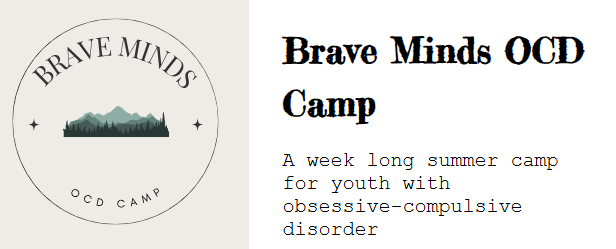Obsessive Compulsive Disorder (OCD) and related disorders affect more than 1 in 100 people around the world — but there is hope.
About OCD PA
OCD Pennsylvania is a non-profit organization dedicated to helping those in Pennsylvania who are affected by Obsessive-Compulsive Disorder and related disorders to live full and productive lives. We serve the community by raising awareness of OCD and its treatment, connecting people affected by OCD with evidence-based services, and facilitating collaboration between professionals. OCD Pennsylvania serves the entire state of Pennsylvania, from Erie and Pittsburgh to Philadelphia and the Pocono Mountains, and all of the areas in between.
About the IOCDF
The International OCD Foundation is a donor-supported nonprofit organization founded in 1986 by a small group of individuals with OCD. The Foundation has grown into an international membership-based organization serving a broad community of individuals with OCD, their loved ones, and mental health professionals and researchers. They have affiliates in 25 states and territories in the US in addition to global partnerships with other OCD organizations and mental health non-profits around the world.
OCD Pennsylvania is the local Pennsylvania affiliate for the International OCD Foundation.
What is OCD?
Obsessive Compulsive Disorder (OCD) is a common mental health disorder affecting approximately 1-3% of the population that tends to be poorly understood by the general public. This causes severe impairment for those affected.
It’s estimated that 1 in 100 adults and 1 in 200 children live with OCD. Despite its prevalence, OCD is often misunderstood and misrepresented in the media as a personality quirk or helpful trait that keeps people organized. In reality, OCD is debilitating and severely impacts those living with the disorder, as well as their friends and family. The World Health Organization (WHO) has ranked OCD in the top ten of the most disabling illnesses of any kind in terms of lost earnings and diminished quality of life.
OCD is highly treatable and responds well to a specific form of Cognitive Behavioral Therapy (CBT) called Exposure and Response Prevention (ERP) therapy. This therapy is often administered in conjunction with medication.
Those struggling with OCD experience recurring and unwanted thoughts, urges, or images (obsessions) that are disturbing and difficult to ignore. These intrusive thoughts, urges, or images are typically accompanied by intense, negative emotions like anxiety, guilt, and disgust.
In order to get rid of these unwanted thoughts and feelings, the individual struggling with OCD turns to repetitive behaviors (called rituals or compulsions) that provide some relief from the thoughts and feelings.
What is the nature of OCD?
When a person is triggered with an obsession, they feel driven to perform a compulsion to reduce their anxiety. Although this behavior is typically successful in reducing the anxiety initially, over time the behavior actually reinforces the obsessive thoughts and feelings and makes them happen more frequently. Consequently, this leads to more compulsions, more obsessions, and more anxiety. Obsessions in OCD vary widely from person to person but may include exaggerated fears of contamination, harming fears, sexually inappropriate thoughts, doubting, or religious fears.
Some facts about OCD:
This disorder often manifests in childhood but can also strike later in life.
It is usually a life-long disorder, but it can be managed.
There is often a great deal of self-imposed shame surrounding the obsessions which cause people struggling with OCD to hide their symptoms from family, friends, and co-workers as well as medical professionals. This often leading to a delay in diagnosis.
Individuals with OCD often experience times where the disorder is relatively quiet and others when the obsessive thoughts are more intense.
OC Spectrum Disorders
Some disorders share traits with OCD and are often called OC Spectrum Disorders. Many therapists who treat OCD also have expertise in treating these additional disorders. OC Spectrum Disorders include hair-pulling (trichotillomania), skin-picking, body dysmorphic disorder and compulsive hoarding.
What causes OCD?
No one knows for sure but evidence indicates that it is biologically-based. Often more than one family member is diagnosed with OCD suggesting that a genetic component is a factor in the etiology of this neurobiological disorder. Sometimes OCD appears to strike at random without any familial component. Whatever the cause may be, Obsessive Compulsive Disorder is a real medical condition.
How does OCD respond to treatment?
OCD treatment has greatly improved in recent years. A form of Cognitive-Behavioral Therapy (CBT) called Exposure and Response Prevention (ERP) has been researched extensively and is shown to be very effective. This form of therapy requires the person with OCD to confront his or her feared triggers, experience his or her unwanted thoughts and feelings that result, and resist the urge to engage in compulsions.
Through repeated exposure, the OCD sufferer becomes more tolerant of unwanted thoughts and feelings and feels less of a need to avoid triggers.
Medication may also be helpful. Selective Serotonin Reuptake Inhibitors (SSRIs) are the treatment of choice and work by balancing the serotonin in a person’s brain so that they experience less anxiety when triggered, and in some cases, have fewer obsessions. The medication can be instrumental in successfully participating in Exposure and Response Prevention therapy.



